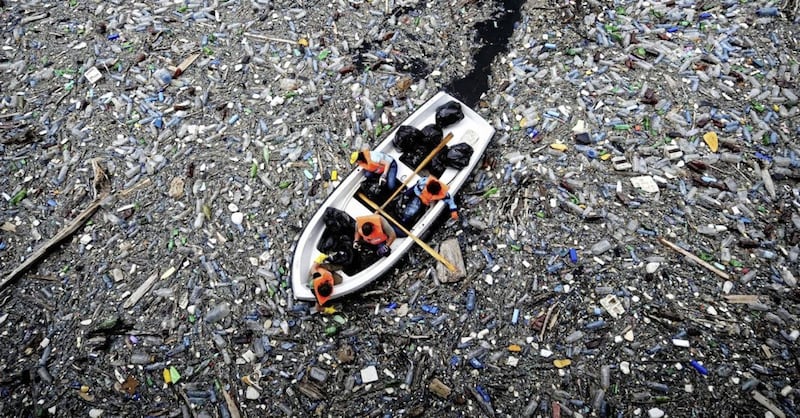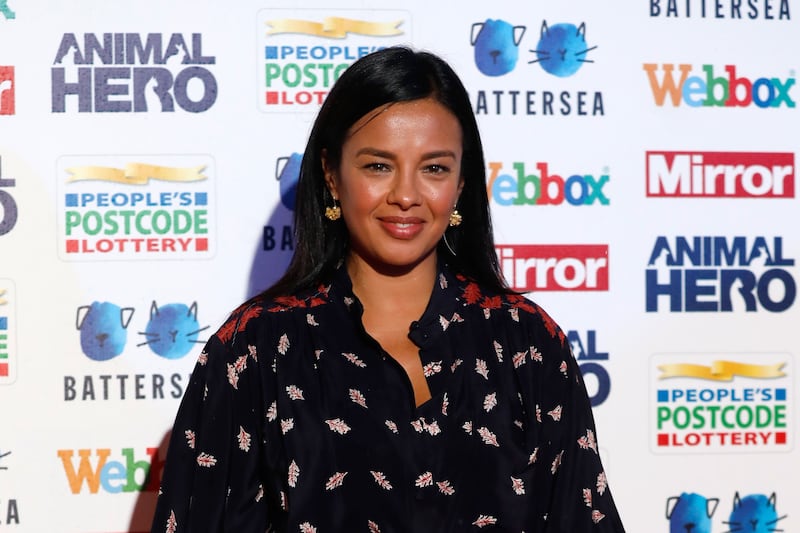TELEVISION presenter Liz Bonnin has called upon us all to "stop skirting around" the issue of plastic pollution and "take action now".
In last autumn's hard-hitting BBC One documentary Drowning in Plastic, Bonnin highlighted the huge impact plastic was having upon our environment globally. Viewers saw her visibly upset as she saw baby flesh-footed shearwater chicks have their stomachs pumped to remove multiple pieces of plastic in a remote island off the coast of Australia.
"We knew what we were going to film and I thought I was prepared, but it really impacted me in a way I underestimated. When you see the direct result of our behaviour and realised what we've been doing to our planet, it's heartbreaking and sickening.
"The algae grows on the plastic in the ocean which makes the bird and sea life think it's food and these birds are literally feeding their chicks to death."
Plastic in our oceans is one of the greatest environmental challenges of our time, and filming the documentary has inspired Bonnin to continue the vitally important debate about how to solve this global crisis, by delivering a series of talks across the UK.
This weeks sees her visit Belfast, as part of the NI Science Festival, when she will be discussing how plastic in our food web affects human health and challenging us to explore what needs to be done to halt the plastic crisis.
"The threats to our planet are big industry, lack of political will and our obsession for economic growth. I am irate at how our world leaders have been operating and how our industries take no responsibility for sustaining our planet and our future. I think that is why, more than with any other programme, I feel so compelled to continue the conversation and tell everyone the hard truth.
"It's not a nice thing to talk about. There is a lot of harrowing and difficult facts to swallow, but I feel we all need to know the real truth of this situation in order to be a part of the solution.
"It has taken us a long time to grasp how climate change is changing our planet. With plastic, it’s tangible: we can see it, smell it, touch it and see what it is doing to marine life. We know it breaks up into tiny pieces and leaks chemicals which are harmful to humans as well as sea life."
One of the biggest revelations from Drowning with Plastic was the realisation that what we thought was being recycled wasn't.
Only nine per cent of the UK's plastic is 'recycled', when in fact it's downcycled and made into lesser-grade plastic. Forty per cent is send abroad to developing countries which don't have the infrastructure to recycle it properly and the rest is incinerated or sent to landfill.
"Many of us point the finger at the developing world and say that's where the dirtiest rivers are and say it's not our problem. That is wrong, it's a global issue and we are all to blame."
Last year the EU announced a crackdown on single-use plastics, yet petrochemical companies plan to increase plastic production by 40 per cent in the next decade.
"Sometimes I'm in discussion at conferences with industry and conservation organisations who talk about how they plan to get rid of certain packaging by 2020 and phase out black packaging in 2025. I have no patience left for that," says Bonnin, who believes we don't have time left to listen to these "false promises".
As well as giving up straws, plastic cups and bags and cleaning up our beaches when plastic is washed up, Bonnin calls upon us all to do practical things to lobby for political and industrial change.
"Every week, write a template letter either asking your MP to implement a ban on all single-use plastic – if Costa Rica can do it, why can't we? – and ban the export of plastic for recycling to developing countries such as Indonesia and Vietnam. Can you imagine if every single person did that, how much change we could create?
"The other thing I Iove doing when shopping in the supermarket, is to unwrap anything I've bought that has plastic packaging at the check-out and put it in my reusable cloth bags. I then smile and say, 'I'm just going to leave that with you'. If each of us did that, retailers would quickly have to implement change," adds the 42-year-old.
Best known for presenting wildlife and science programmes including Galapagos, How the Earth Works, Stargazing Live and Should We Close Our Zoos? Bonnin is a qualified biochemist and wild animal biologist.
Born in France, she moved to Ireland when she was nine and did a biochemistry degree at Trinity College Dublin, before taking a year out, where she had brief pop success with the girl group Chill and working on Irish TV programmes such as The Den and Off the Rails.
"There was this lovely woman, Mary Curtis, a producer in RTE at the time, who inspired me to learn how to tell stories on television. I had a ball and stayed in entertainment television longer than I planned," laughs Bonnin, who even presented the BBC1's cult music show Top of the Pops.
Eventually she returned to her first love, science, and went on to complete post graduate studies in animal biology in London.
"I thought, how about if I communicate and tell stories about the natural world? The timing was right and it all came together. I'm very lucky to do what I do, even though it's a difficult time now environmentally."
Bonnin returns to on our screens in March presenting Blue Planet Live, alongside Chris Packham and Steve Backshall.
"We will be covering our spectacular ocean and species, as well as focusing greatly on the prevailing threats. I will be on the Great Barrier Reef and will be releasing some turtles and working alongside scientists who are carrying out coral IVF, which is aiming to help our corals regenerate."
She is also embarking on a new BBC documentary investigating our meat consumption and production, entitled Meat: A Threat To Planet Earth.
:: The Problem with Plastics with Liz Bonnin takes place at Belfast's Whitla Hall on February 24 at 4pm as part of the NI Science Festival. For tickets and full festival programme visit Nisciencefestival.com









